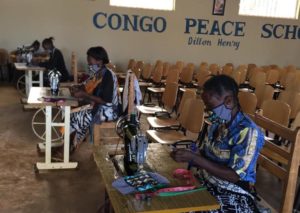COVID-19 has reached the Democratic Republic of the Congo (DRC) and is spreading rapidly. As of April 23, 377 cases have been confirmed, with 25 deaths – almost a 7% mortality rate. The government ordered a countrywide lockdown in response to COVID-19, but the DRC lacks the resources, infrastructure and perhaps even the will to support its war-beleaguered civilians through this type of quarantine. This grim reality has led Jewish World Watch’s partners on the ground – most notably visionary activist Amani Tom – to proclaim that hunger will kill more Congolese than the deadly virus.
Unless the pressing concerns of Congolese civilians are taken into account and community leaders are empowered to be at the forefront of the response, the DRC’s efforts to combat COVID-19 will fail – much as they did with Ebola. Local leaders, like Amani, are leading the charge against the spread of COVID-19, designing informed and innovative interventions to meet the evolving needs of their communities. These local initiatives need our support to ensure that COVID-19 does not wreak further havoc on a civilian population already grappling with ongoing mass atrocities and poverty.
Sign up now for this Sunday’s Virtual Gathering to hear directly from Amani, who will be sharing a live report from the Democratic Republic of the Congo.
[maxbutton id=”64″]
Learning from Ebola
COVID-19 touched down in the Congo just as a victory over an 18-month long Ebola epidemic seemed within reach. While Ebola and COVID-19 differ in their means of transmission and mortality rates, lessons can be learned from the Congo’s problematic Ebola response. The failure of Ebola responders to address people’s deep distrust of the Congolese government, as well as to properly engage local community leaders, led to widespread resistance and suspicion among the affected population and greatly compromised efforts to stymie Ebola’s spread. Fixation with stopping the spread eclipsed the many other pressing concerns of the civilian population – including the ongoing mass atrocities in the Ebola epicenter of North Kivu that had them fleeing for their lives. The number-one takeaway from Congo’s Ebola response is that the government needs community buy-in and direct local engagement in containment efforts. COVID-19 response must begin with an understanding of the existential challenges Congo’s most vulnerable communities are already facing and empowering trusted local leaders to lead.
Context is everything
The people of the Congo, particularly the most vulnerable populations, are facing a perfect storm of risks. Ebola cases are resurfacing, forcing the already weakened health sector to battle simultaneously two highly infectious diseases. On top of that, flooding has impacted 80,000 civilians. Natural disasters do not stop for COVID-19 – nor do mass atrocities. Recent attacks on civilian populations throughout the country have freshly uprooted tens of thousands of people – just as COVID-19 has touched down and begun its rampant spread. Interethnic violence and attacks by assailants in the Ituri province have subjected civilians to unconscionable brutality, including the use of machetes to kill women and children, as well as acts of rape, pillage, arson, and the killing of livestock.
Moreover, the government’s COVID-19 response is itself creating even more challenges for the Congolese people. A country-wide lockdown in response to the first cases of COVID-19 has jeopardized the majority of Congolese citizens, who must work daily in order to eat. Closure of critical borders has also created food supply shortage issues. How are people supposed to stay at home when they have no means of feeding their families, and no government services to fill these life-or-death needs? Our partners have been telling us for weeks what experts are finally talking about: that hunger is a greater threat to the people of the Congo than COVID-19.
Community involvement is key
No one understands the myriad challenges shaping COVID-19 response better than the civil society organizations that have had to step in to support the people of the Congo in the absence of a functioning government. That’s why Jewish World Watch has always focused on empowering local changemakers and the communities they serve to design interventions that meet a variety of changing needs in this atrocity-affected country.
Recognizing that food insecurity and the desperation it breeds will be primary impediments to containing COVID-19, Jewish World Watch’s longtime partner Amani Tom and his organization are coupling preparedness with food provision. Amani has repurposed the Jewish World Watch-funded school for war-affected children he runs to serve as an around-the-clock kitchen to feed the students who depend on going to the school for their only guaranteed daily meal. He is also providing personal protective equipment (PPE) to vulnerable community members paired with packs containing a full month’s supply of food – understanding that social distancing and self-isolation can only be realized when hunger is kept at bay. Finally, he is using the radio broadcasts to inform last-mile community members about COVID-19 prevention with his own familiar voice – a voice the people of South Kivu have come to trust and love as a leader.
Amani is also building buy-in and trust by involving his community in the response. Mothers who survived gender-based violence as young women and have completed vocational training through programming through Amani’s organization are now sewing life-saving face masks for their communities. This is precisely the type of local, informed, and comprehensive approach that will protect the people of the Congo from COVID-19.
Jewish World Watch is supporting Amani’s efforts doing our part to operationalize these efforts to meet the challenges of COVID-19.
With your help, JWW has also provided Amani with emergency funds to provide PPE to last-mile villages in South Kivu, as well as essential food supplies and radio programming.
Amani will be joining Jewish World Watch from the Congo this Sunday morning at 11:00 a.m. (PDT) during a meaningful Virtual Gathering. Please tune in to hear directly from this Congolese hero about how he’s engaging his community to respond to COVID-19 and how you can help support these lifesaving efforts.
[maxbutton id=”64″]


